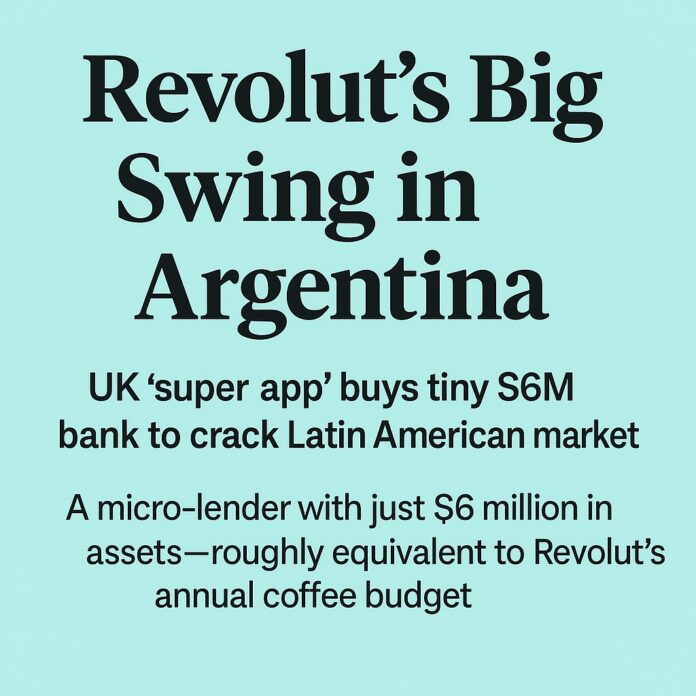UK “super-app” buys a tiny $6 million bank to take on Latin America’s wildest market
A licence hidden inside a bargain
Revolut has struck a deal to acquire Banco Cetelem Argentina, a micro-lender with just US $6.4 million in assets—small change for a fintech valued at US $45 billion. Yet inside that price tag sits the real prize: a full Argentine commercial-bank licence (Finextra report).
Why Revolut cares about this sliver of the Pampas
| Strategic lever | What the Cetelem licence unlocks | Why it matters for Revolut |
|---|---|---|
| Regulatory fast-lane | Immediate permission to accept deposits, issue cards and lend in pesos & dollars | Faster and cheaper than a green-field licence application |
| Hard-currency rails | Direct access to Argentina’s official FX market | Critical for Revolut’s hallmark low-cost remittances and dollar accounts |
| Balance-sheet products | Ability to book loans and offer interest-bearing savings | Higher-margin credit in a market where only 27 % of adults have a bank loan |
| Brand credibility | “Full-service bank” status, not just a wallet | Differentiates Revolut from Mercado Pago and Ualá |
Argentina is simultaneously hyper-inflationary (43.5 % YoY in May 2025) and digitally saturated (≈85 % mobile-internet penetration). Consumers hoard dollars, flock to fintech apps and gripe about the peso—exactly the cocktail Revolut’s multi-currency model was built for.
The competitive arena
- Fintech incumbents: Mercado Pago (64 m monthly users) and Ualá (6 m) dominate digital wallets.
- Traditional banks: Banco Galicia, Banco Macro and ICBC Argentina still hold most payroll deposits but lag in UX.
- Policy backdrop: President Javier Milei’s reforms have cooled inflation and nudged regulators to reopen the door to foreign capital—but the Central Bank of Argentina (BCRA) can still attach strict conditions.
Three dragons Revolut must slay
| Dragon | What could go wrong | Revolut’s armour |
|---|---|---|
| Peso turbulence | A fresh devaluation would vaporise local earnings | Dollarised savings pots and NDF hedging |
| Regulator mood-swings | BCRA could stall approval or demand hefty on-shore capital | Early stakeholder work headed by ex-Galicia exec Agustín Danza as country CEO |
| Fintech price war | Rivals may slash FX fees to zero | Bundle FX, stocks and crypto in one app competitors can’t yet match |
Bigger than Buenos Aires
Cetelem would become Revolut’s third American banking licence (after Mexico and a restricted U.S. charter) and fits CEO Nik Storonsky’s doctrine: “buy licences, not lawyers’ hours.” Each local charter lets Revolut keep deposits on its own balance sheet, offer credit directly and inch closer to the oft-rumoured US $150 billion IPO dream.
What happens next?
- Q3 2025 – BCRA opens a 30-day public-comment window on the takeover.
- Early 2026 – If approved, Cetelem is re-skinned as Revolut Argentina with virtual cards and dollar wallets.
- 2026–27 – Roll-out of peso credit, equities and crypto once local risk teams scale.
🔍 Bottom line
Revolut just bought a front-row seat at South America’s most volatile circus. If it can juggle inflation, regulation and cut-throat competition, the tiny Cetelem badge could become the launchpad for Revolut’s boldest growth story yet.




